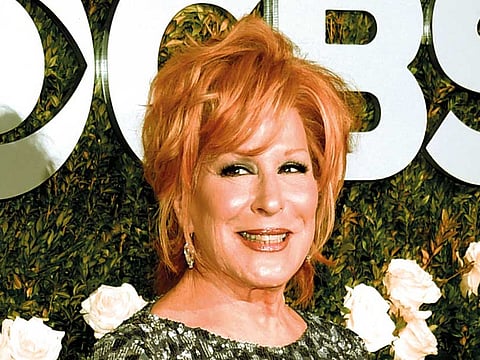Bette Midler apologises over controversial tweet
Actress made a post using an offensive phrase from a John Lennon and Yoko Ono song

As protests in Washington unfolded on Thursday in response to the sexual assault allegations against Supreme Court nominee Brett Kavanaugh and his upcoming procedural vote in the Senate, actress Bette Midler took to Twitter to make her feelings known. The end result was the Hocus Pocus actress tweeting an offensive phrase from a John Lennon and Yoko Ono song and being on the wrong end of a lot of criticism.
“’Women, are the n-word of the world,’” the actress tweeted on Thursday. “Raped, beaten, enslaved, married off, worked like dumb animals; denied education and inheritance; enduring the pain and danger of childbirth and life IN SILENCE for THOUSANDS of years.”
She concluded: “They are the most disrespected creatures on earth.”
Midler, 72, was paraphrasing the title of a 1972 song written by Lennon and Ono. Much like the response Lennon and Ono received at the time of the song’s release, Midler was met with outrage. On Twitter, people condemned the actress and called on her to delete the tweet, which would receive 14,000 likes and more than 8,000 replies, the majority of which were critical, according to USA Today.
Users made it clear in their responses that it was not right for Midler to use the word, or make any such comparison. One of the most notable rebukes came from Jemele Hill, a reporter for the Atlantic who recently left ESPN: “Full stop.”
Midler responded a couple of hours later. But instead of apologising, she doubled down on her previous comments, emphasising that her message was not about race but gender.
“I gather I have offended many by my last tweet,” she wrote. “‘Women are the ... etc’ is a quote from Yoko Ono from 1972, which I never forgot. It rang true then, and it rings true today, whether you like it or not. This is not about race, this is about the status of women; THEIR HISTORY.”
Midler would later delete both tweets. She would also apologise hours after the initial tweet.
“The too brief investigation of allegations against Kavanaugh infuriated me,” she stated. “Angrily I tweeted w/o thinking my choice of words would be enraging to black women who doubly suffer, both by being women and by being black. I am an ally and stand with you; always have. And I apologise.”
Released in April 1972, Lennon and Ono hailed the song as a pro-feminist anthem, a stinging attack on the patriarchy. Even though the National Organization for Women awarded the song with a “Positive Image of Women” citation, almost every radio station in the country chose not to play it.
Sign up for the Daily Briefing
Get the latest news and updates straight to your inbox



